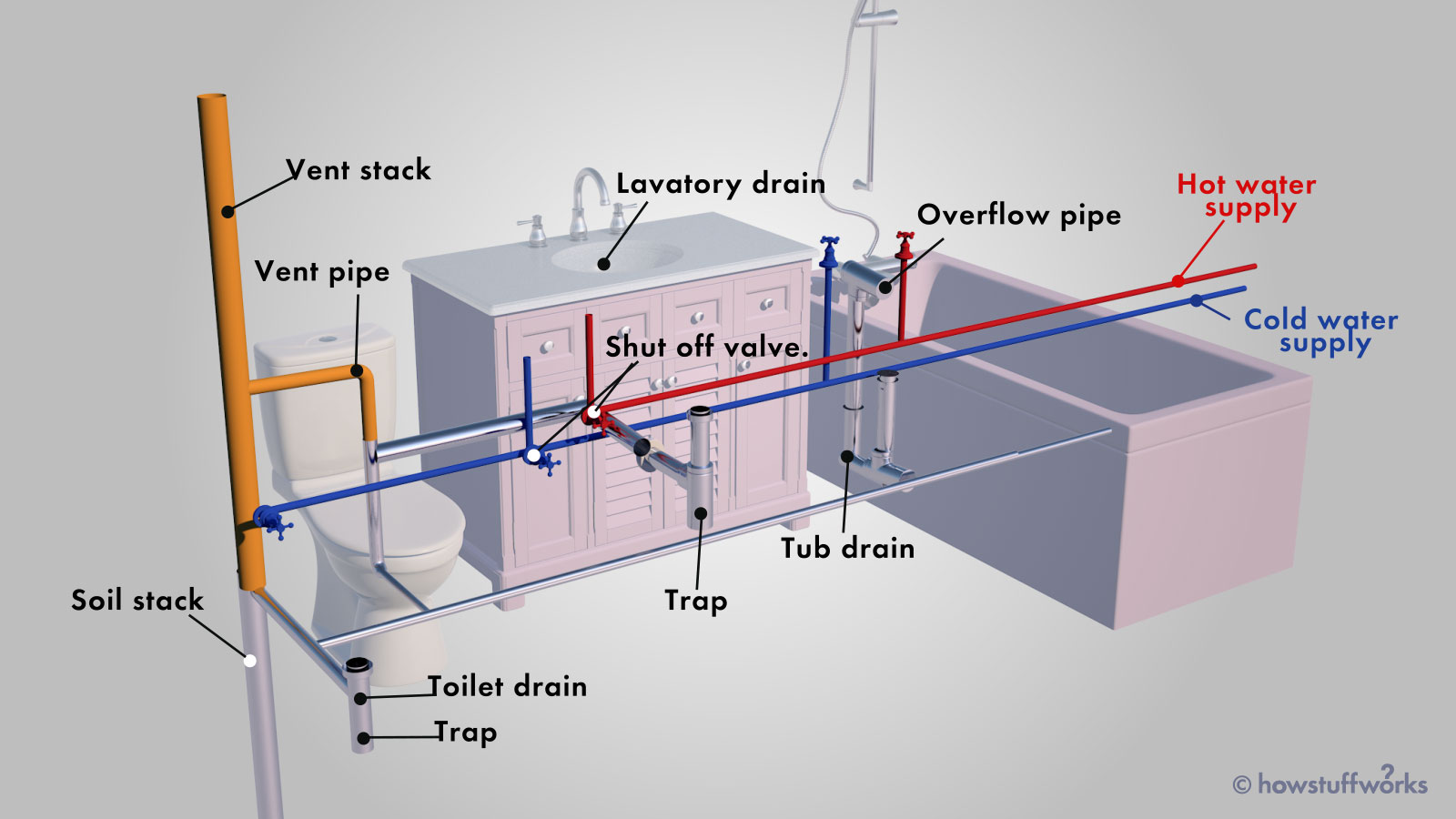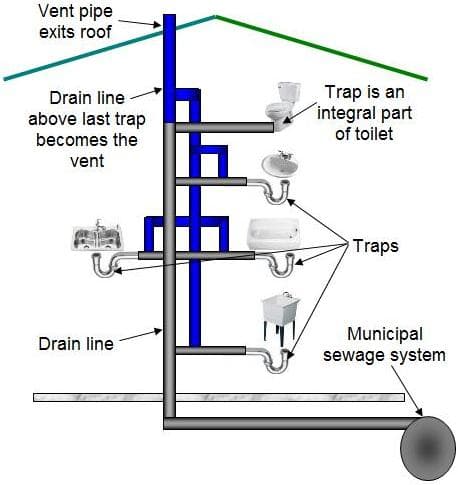The Core Elements of Your Property's Plumbing System
The Core Elements of Your Property's Plumbing System
Blog Article
How do you feel when it comes to Understanding Your Home's Plumbing Anatomy?

Comprehending just how your home's pipes system functions is vital for each homeowner. From supplying tidy water for drinking, cooking, and bathing to securely eliminating wastewater, a well-maintained pipes system is important for your family's wellness and convenience. In this extensive overview, we'll discover the elaborate network that composes your home's pipes and offer pointers on maintenance, upgrades, and taking care of common problems.
Intro
Your home's plumbing system is more than simply a network of pipes; it's a complicated system that guarantees you have access to tidy water and effective wastewater elimination. Knowing its elements and just how they work together can assist you prevent costly repair work and guarantee every little thing runs efficiently.
Basic Parts of a Pipes System
Pipes and Tubing
At the heart of your plumbing system are the pipes and tubes that carry water throughout your home. These can be made of various products such as copper, PVC, or PEX, each with its benefits in terms of durability and cost-effectiveness.
Components: Sinks, Toilets, Showers, etc.
Components like sinks, bathrooms, showers, and bath tubs are where water is used in your home. Understanding how these fixtures attach to the pipes system aids in diagnosing problems and preparing upgrades.
Shutoffs and Shut-off Factors
Shutoffs regulate the flow of water in your plumbing system. Shut-off valves are vital throughout emergency situations or when you need to make repair work, enabling you to separate parts of the system without interfering with water circulation to the entire house.
Supply Of Water System
Main Water Line
The main water line links your home to the municipal water supply or a private well. It's where water enters your home and is distributed to various fixtures.
Water Meter and Pressure Regulatory Authority
The water meter measures your water usage, while a pressure regulator ensures that water flows at a safe stress throughout your home's pipes system, stopping damages to pipelines and fixtures.
Cold Water vs. Hot Water Lines
Comprehending the difference in between cold water lines, which provide water straight from the main, and hot water lines, which carry heated water from the hot water heater, aids in repairing and preparing for upgrades.
Water drainage System
Drain Pipes Piping and Traps
Drain pipes carry wastewater away from sinks, showers, and bathrooms to the sewer or septic tank. Traps prevent sewer gases from entering your home and also trap debris that might trigger clogs.
Ventilation Pipes
Ventilation pipes enable air into the drain system, stopping suction that could slow drain and trigger traps to empty. Appropriate ventilation is vital for preserving the integrity of your plumbing system.
Importance of Correct Water Drainage
Making certain appropriate drain avoids backups and water damages. Regularly cleaning drains and keeping catches can protect against expensive repair work and expand the life of your pipes system.
Water Heater
Kinds Of Hot Water Heater
Water heaters can be tankless or conventional tank-style. Tankless heaters warmth water on demand, while storage tanks save warmed water for instant use.
How Water Heaters Connect to the Pipes System
Comprehending how hot water heater link to both the cold water supply and hot water circulation lines aids in identifying issues like insufficient warm water or leaks.
Maintenance Tips for Water Heaters
Regularly purging your hot water heater to remove sediment, examining the temperature level setups, and evaluating for leakages can extend its lifespan and boost energy efficiency.
Usual Pipes Problems
Leakages and Their Causes
Leakages can occur as a result of maturing pipes, loosened fittings, or high water stress. Addressing leaks without delay avoids water damages and mold growth.
Blockages and Obstructions
Clogs in drains and bathrooms are typically brought on by flushing non-flushable things or a buildup of grease and hair. Making use of drain displays and bearing in mind what goes down your drains pipes can protect against blockages.
Indicators of Plumbing Issues to Expect
Low water stress, sluggish drains pipes, foul odors, or uncommonly high water costs are indications of possible plumbing troubles that ought to be attended to promptly.
Pipes Maintenance Tips
Routine Assessments and Checks
Schedule annual plumbing examinations to catch concerns early. Search for indicators of leaks, deterioration, or mineral build-up in faucets and showerheads.
Do It Yourself Upkeep Tasks
Easy tasks like cleansing faucet aerators, looking for bathroom leaks making use of dye tablets, or shielding revealed pipes in chilly climates can avoid significant plumbing problems.
When to Call a Specialist Plumbing
Know when a pipes concern requires professional competence. Attempting intricate repairs without appropriate understanding can bring about more damage and higher repair service expenses.
Updating Your Pipes System
Reasons for Upgrading
Updating to water-efficient components or changing old pipelines can boost water quality, decrease water expenses, and raise the value of your home.
Modern Plumbing Technologies and Their Advantages
Discover technologies like smart leak detectors, water-saving bathrooms, and energy-efficient hot water heater that can conserve cash and lower ecological effect.
Cost Considerations and ROI
Compute the in advance expenses versus long-lasting cost savings when thinking about plumbing upgrades. Several upgrades spend for themselves via minimized energy expenses and fewer repairs.
Ecological Impact and Preservation
Water-Saving Components and Home Appliances
Installing low-flow faucets, showerheads, and commodes can dramatically lower water use without giving up efficiency.
Tips for Lowering Water Use
Straightforward habits like dealing with leaks quickly, taking much shorter showers, and running complete lots of washing and meals can save water and lower your utility bills.
Eco-Friendly Plumbing Options
Consider sustainable pipes products like bamboo for floor covering, which is durable and green, or recycled glass for kitchen counters.
Emergency situation Preparedness
Actions to Take During a Plumbing Emergency situation
Know where your shut-off shutoffs lie and exactly how to shut off the supply of water in case of a burst pipeline or significant leakage.
Value of Having Emergency Contacts Handy
Maintain get in touch with info for neighborhood plumbing professionals or emergency situation services readily offered for fast action during a plumbing situation.
Do It Yourself Emergency Fixes (When Relevant).
Momentary repairs like making use of duct tape to patch a dripping pipe or positioning a pail under a leaking faucet can decrease damages until a specialist plumbing technician gets here.
Final thought.
Recognizing the composition of your home's plumbing system encourages you to maintain it properly, conserving time and money on repair services. By following routine maintenance regimens and staying notified concerning contemporary plumbing modern technologies, you can ensure your pipes system operates efficiently for several years to find.
HOW YOUR PLUMBING SYSTEM WORKS
Which Pipes Do What?
Blue lines = fresh water supply entering the building
Red lines = hot water supply entering the building
Grey lines = pipes carrying waste away from the building and venting pipes carrying gases away from the building (through the roof)
YOUR MAIN PLUMBING SYSTEMS
There are two main plumbing systems that support your home s basic plumbing needs one that brings clean water into your home, and one that sends dirty water away from your home. Connected to the toilet, bath, shower, and other faucets in your home, these two systems keep your water flowing in the right directions.
ACCESSING FRESH WATER
Fresh and clean water is brought into your home through the main water supply line . Filtered through one pipe, this water is pressured to flow into the various fixtures in your home at any given time.
This water can be sourced from a well located on your property, a pond or river (mostly cottages), or, as in most cases, from the city s municipal water treatment centre. However, it is important to note that water that is untreated, such as the water siphoned from ponds or rivers, may not be safe to drink. Personal water supplies always need to be treated for hardness and contaminants before consumed.
MUNICIPAL WATER SUPPLIES
Improve taste and odour
Remove sediment
Eliminate hardness
Reduce chlorine
COLD WATER SUPPLY VS. HOT WATER SUPPLY
Cold water flows into your home or building through the service line, which then distributes hot or cold water to your fixtures. This line is most commonly run through a central column that runs floor to floor. Hot water runs in short and straight pipes as the longer the pipeline, the more heat that will be lost in the transfer. Having shorter pipes also allows residents to access hot water more quickly.
WASTE WATER SYSTEM
Your wastewater system is divided into two parts pipes that send wastewater away from your home and venting pipes that send sewer gas away from your home. Sewage water travels through pipes that flush the water and waste towards local sewers that are operated and managed by your city or town. Most sewer systems rely on gravity to move the wastewater to where it needs to go.
The further away from your toilet or sink, the larger wastewater pipes become. This allows for waste to be disposed of from various parts of your home or business at once without pipe blockages. The angle and flow of these pipes are also essential for keeping your waste pipes clear of build up.
https://harrisplumbing.ca/how-your-home-plumbing-system-works/

HOW YOUR PLUMBING SYSTEM WORKS
Which Pipes Do What?
YOUR MAIN PLUMBING SYSTEMS
There are two main plumbing systems that support your home s basic plumbing needs one that brings clean water into your home, and one that sends dirty water away from your home. Connected to the toilet, bath, shower, and other faucets in your home, these two systems keep your water flowing in the right directions.
ACCESSING FRESH WATER
Fresh and clean water is brought into your home through the main water supply line . Filtered through one pipe, this water is pressured to flow into the various fixtures in your home at any given time.
This water can be sourced from a well located on your property, a pond or river (mostly cottages), or, as in most cases, from the city s municipal water treatment centre. However, it is important to note that water that is untreated, such as the water siphoned from ponds or rivers, may not be safe to drink. Personal water supplies always need to be treated for hardness and contaminants before consumed.
MUNICIPAL WATER SUPPLIES
COLD WATER SUPPLY VS. HOT WATER SUPPLY
Cold water flows into your home or building through the service line, which then distributes hot or cold water to your fixtures. This line is most commonly run through a central column that runs floor to floor. Hot water runs in short and straight pipes as the longer the pipeline, the more heat that will be lost in the transfer. Having shorter pipes also allows residents to access hot water more quickly.
WASTE WATER SYSTEM
Your wastewater system is divided into two parts pipes that send wastewater away from your home and venting pipes that send sewer gas away from your home. Sewage water travels through pipes that flush the water and waste towards local sewers that are operated and managed by your city or town. Most sewer systems rely on gravity to move the wastewater to where it needs to go.
The further away from your toilet or sink, the larger wastewater pipes become. This allows for waste to be disposed of from various parts of your home or business at once without pipe blockages. The angle and flow of these pipes are also essential for keeping your waste pipes clear of build up.
https://harrisplumbing.ca/how-your-home-plumbing-system-works/
We were shown that editorial on Exploring Your Homes Plumbing Anatomy from an associate on a different web property. Enjoyed reading our post? Please quickly share it. Help someone else discover it. I thank you for your readership.
Hire A Pro Report this page